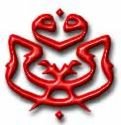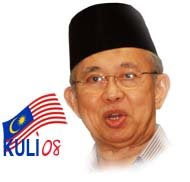http://malaysiana1.blogspot.com/2008/03/tengku-razaleigh-hamzah-malaysias.html
First, allow me to talk about Hang Jebat.
Hang Jebat was a great aboriginal Malay leader of the Galang (or Laut) tribe of Johor and the cousin of Hang Tuah, the legendary defence minister (or Datuk Laksamana) of the ancient Melaka and Johor Empire in the 15th century.
Both Hang Tuah and Hang Jebat are sacred in Malay (Johorean) mythology and they symbolise the two eternally antagonistic principles in Native Malaysian (Malay) politics.
The two principles are, firstly, as represented by Tuah, following the leader and not challenging him, regardless of the costs of not doing so.
And secondly, as represented by Jebat, opposing a leader whose views may seem unjust to many, for the good of society.
The Sultan of Melaka and Johor, Sultan Mansur Shah 1, once sentenced Tuah to death, after listening to rumours that Tuah had an affair with one of the Sultan’s wives.
But the Sultan’s trusted Chief Minister Tun Perak knew Tuah well, and faked the execution.
(Tun Perak is the ancestor of Deputy Prime Minister Datuk Seri Najib Razak, Education Minister Datuk Seri Hishammuddin Hussein, his father and third Prime Minister Tun Hussein Onn, his grandfather and UMNO founder president Datuk Onn Jaafar, and the royal houses of Johor, Perak, Selangor, Pahang and Terengganu)
Jebat, one of the Sultan’s army commanders, revolted against the Sultan and caused the Melaka and Johor court to leave Melaka City for Pahang, which was also a vassal state of Melaka and Johor.
Jebat, who became regent of Melaka and Johor for a short while, challenged the Sultan and Tun Perak to bring forth their best fighters to fight him to death, before the Melaka and Johor throne could be restored to the Sultan.
None of the Sultan’s and Tun Perak’s fighters dared to face Jebat, who was the kingdom’s strongest fighter after Tuah.
As the Sultan regretted “killing” Tuah, Tun Perak promptly brought forth Jebat’s cousin to the Sultan, and Tuah was promptly given a royal apology.
And a new task - to execute Jebat, his cousin, for treason.
Tuah and Jebat subsequently fought to death, with Tuah emerging victorious.
Jebat willingly died for his elder cousin, taking to the grave his solemn belief that it was necessary to fight against the leader’s unjust and unfair decisions even if it meant death.
Tuah made a painful decision to kill his own cousin, as it was his solemn belief that one who broke the law by rebelling against authority had to be punished accordingly.
Both Tuah and Jebat promised each other, in the duel, that whoever won would see his principle triumph in Malay (Johor) culture for all times.
Tuah won, and his principle triumphed in Malay (Johor) culture, including the culture of the United Malay National Organisation (UMNO) until the country celebrated its 30th birthday in 1987.
In that year Kelantanese prince Tengku Razaleigh Hamzah offered himself as a candidate in the UMNO party presidential election.
He went against the fifth UMNO president and fourth Prime Minister Tun Dr Mahathir Mohamad and narrowly lost.
As a result, Razaleigh and his supporters were forced to quit UMNO, and formed the Malay Party Of The Spirit Of 1946 or Parti Melayu Semangat 46.
Razaleigh’s supporters included his political mentors Tun Hussein Onn and Malaysia’s first Prime Minister and Father of Malaysia Tunku Abdul Rahman Putra.
They nudged him to fight for the presidency as they believed that Tun Dr Mahathir was moving Malaysia on a path that, while beneficial for the nation in the short run, negated the two-party democratic system that they always stood for.
Razaleigh and his supporters did not challenge the UMNO president out of greed, but out of principles and a love for democracy.
As the brilliant visionary Tun Dr Mahathir tolerated no opposition in UMNO, Razaleigh and his allies had no choice but to be cast out of the party, and form their own party.
Semangat 46 fought UMNO in two general elections in 1990 and 1995. Its support dwindled over the years, as the Malaysian economy became bullish and strong no thanks to the brilliant economic management of Tun Dr Mahathir.
Razaleigh and his backers soon realised that the indigenous Peninsular Malaysians preferred Tun Dr Mahathir’s UMNO, and thus, for the sake of Malay unity, the breakaway party gave up its fight and its members were re-absorbed into UMNO in 1996.
In 2004, Razaleigh once again contested the UMNO presidency, this time against his former ally Datuk Seri Abdullah Ahmad Badawi, the fifth Malaysian Prime Minister who succeeded Tun Dr Mahathir. He lost.
And this year, he is once again contesting the UMNO presidency against Abdullah.
Razaleigh, whose father, Kelantan’s first post-Independence Menteri Besar (Head Minister) Tengku Hamzah Tengku Zainal Abidin was a multi-millionaire businessman, does not challenge his party bosses out of greed or jealousy.
He always does so to keep the spirit of democracy alive in the party and society. He believes in the way of Jebat, not the way of Tuah.
Here is a brief biography of Razaleigh, who is nicknamed Ku Li by family and friends.
Razaleigh was born on April 13, 1937 in Kota Baru, Kelantan.
He received his early education in Kota Baru’s first English school Sultan Ismail College and the Malay College Kuala Kangsar, Perak.
He graduated with first class honours in economics at Belfast University in Britain.
Razaleigh, whose father was a founder of UMNO Kelantan, managed Malaysia’s National Oil Company (PETRONAS) and the Indigenous People’s Bank of Malaysia (CIMB) before he became a cabinet minister in 1976.
He also became the leader of Malaysia’s first trade mission to China in 1971.
As a cabinet minister, he handled Finance from 1976-1984 and International Trade and Industry from 1984-1987.
Throughout his days as a minister and later an opposition leader, Razaleigh upheld secular and multi-racial politics, and always spoke up for democracy, meritocracy and liberalism.
Until today, he is one of the most respected indigenous Malaysian politicians in the eyes of the Malaysian Chinese and Malaysian Indian communities.
Monday, April 7, 2008
Subscribe to:
Post Comments (Atom)


No comments:
Post a Comment